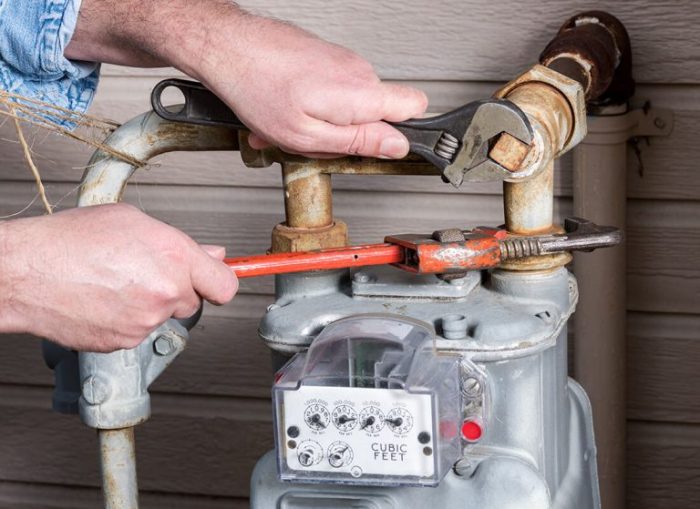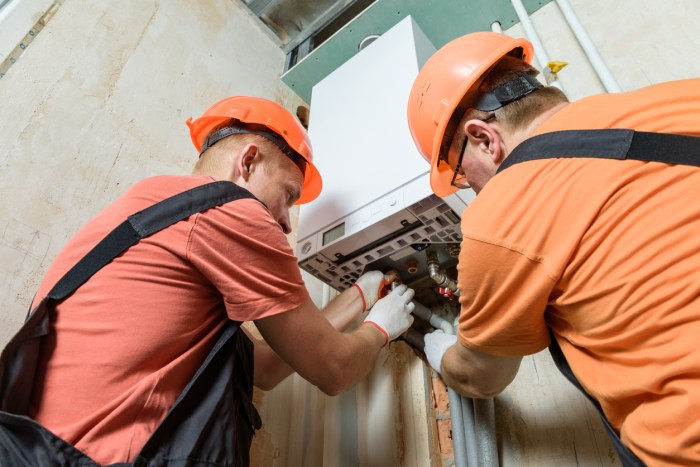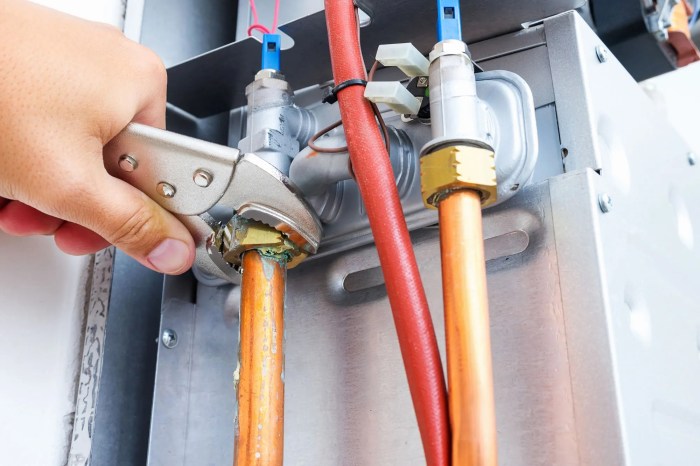Persona que repara las instalaciones de gas – Gas fitters play a crucial role in ensuring the safe and efficient operation of gas systems in residential, commercial, and industrial settings. Their expertise in installing, maintaining, and repairing gas lines and appliances is essential for the well-being of communities and the smooth functioning of various industries.
This comprehensive guide delves into the multifaceted world of gas fitters, exploring their duties and responsibilities, essential skills and qualifications, commonly used tools and equipment, typical work environments, and potential career paths. By shedding light on this vital profession, we aim to foster a deeper understanding of the critical role gas fitters play in our modern society.
Duties and Responsibilities

Gas fitters are responsible for the installation, maintenance, and repair of gas systems in residential, commercial, and industrial settings. They must adhere to strict safety protocols and regulations to ensure the safe and efficient operation of gas appliances and systems.
Their duties include:
- Installing gas lines and appliances, such as furnaces, boilers, and water heaters
- Maintaining and repairing gas systems, including leak detection and repairs
- Inspecting gas systems for safety and compliance with codes and regulations
- Educating customers on the safe use and maintenance of gas appliances
Skills and Qualifications, Persona que repara las instalaciones de gas
To be a successful gas fitter, one must possess a range of skills and qualifications:
- Thorough knowledge of gas codes and regulations
- Understanding of plumbing and electrical systems
- Physical fitness and dexterity
- Excellent communication and interpersonal skills
- High school diploma or equivalent
- Completion of an apprenticeship program or vocational training
- Licensing and certification from a recognized authority
Tools and Equipment
| Tool Name | Description | Purpose | Safety Precautions |
|---|---|---|---|
| Gas Leak Detector | Electronic device that detects the presence of gas leaks | Locating and identifying gas leaks | Calibrate regularly, use in well-ventilated areas |
| Pressure Gauge | Measures the pressure of gas in a system | Ensuring proper gas flow and pressure | Handle with care, protect from damage |
| Pipe Wrench | Adjustable wrench for tightening and loosening pipes | Installing and repairing gas lines | Use proper size, avoid overtightening |
| Flare Nut Wrench | Specialized wrench for tightening and loosening flare fittings | Connecting gas lines to appliances | Use correct size and torque, prevent leaks |
Work Environment
Gas fitters typically work in both indoor and outdoor settings. They may encounter hazardous conditions, such as gas leaks, confined spaces, and exposure to chemicals.
To ensure safety, gas fitters must:
- Wear appropriate personal protective equipment (PPE)
- Follow safety protocols and procedures
- Be aware of potential hazards and risks
- Maintain a clean and organized work area
Career Path and Advancement
Gas fitters have various career paths, including specialization in areas such as commercial or industrial gas systems. They may also advance to management roles.
Factors influencing career advancement:
- Experience and expertise
- Certifications and professional development
- Networking and industry involvement
- Market demand and economic conditions
Gas fitters enjoy a stable and rewarding career with strong earning potential and job outlook.
Detailed FAQs: Persona Que Repara Las Instalaciones De Gas
What are the primary responsibilities of a gas fitter?
Gas fitters are responsible for installing, maintaining, and repairing gas systems, including gas lines, appliances, and fixtures. They ensure that gas systems comply with safety codes and regulations, and they troubleshoot and resolve any issues that may arise.
What skills and qualifications are required to become a gas fitter?
Gas fitters typically require a combination of technical skills, such as knowledge of gas codes and plumbing and electrical systems, as well as physical fitness and dexterity. They must also complete an apprenticeship or formal training program and obtain a license or certification in their jurisdiction.
What are the potential hazards and risks associated with working as a gas fitter?
Gas fitters work with potentially hazardous materials and equipment, including flammable gases and high-pressure systems. They must be aware of the risks of gas leaks, explosions, and other accidents, and they must take appropriate safety precautions to protect themselves and others.

